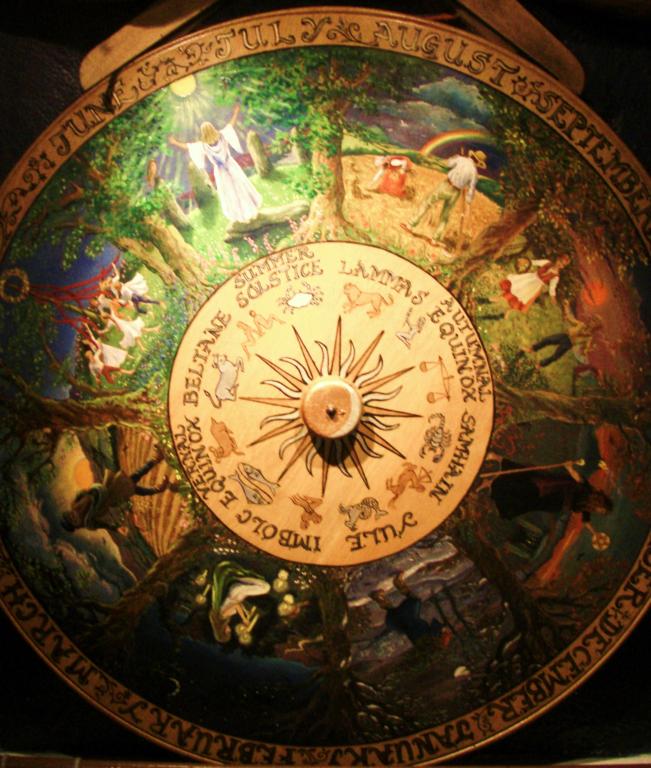 For all intents and purposes I’m a “Pagan Minimalist*.” That doesn’t mean my practice is minimal or small, it means that I view Modern Paganism as a relatively recent phenomenon. If you were to ask me how old I think a practice like Modern Wicca is; I would offer you a guess of maybe seventy years on the high end. Seventy years is a pretty long time, but for a lot of people that’s just not long enough. They like to make the argument that Wicca is hundreds if not thousands of years old, and all passed down secretly in a continuous chain. I think our society has a tendency to equate the age of a religion with legitimacy; the older a religion is, the more valid it is. If Wicca is not 1000 years old, to some, it becomes less valid.
For all intents and purposes I’m a “Pagan Minimalist*.” That doesn’t mean my practice is minimal or small, it means that I view Modern Paganism as a relatively recent phenomenon. If you were to ask me how old I think a practice like Modern Wicca is; I would offer you a guess of maybe seventy years on the high end. Seventy years is a pretty long time, but for a lot of people that’s just not long enough. They like to make the argument that Wicca is hundreds if not thousands of years old, and all passed down secretly in a continuous chain. I think our society has a tendency to equate the age of a religion with legitimacy; the older a religion is, the more valid it is. If Wicca is not 1000 years old, to some, it becomes less valid.
For several decades the theory that “Wicca is really old” was a part of our collective DNA. Witches who were executed during “The Burning Times” of the Middle Ages/Renaissance were thought to be practicing the same religion first publicly written about in Gerald Gardner’s “Witchcraft Today” (published in 1954). Some Witches traced their history back even further, equating Modern Witchcraft with ancient Shamanism, or the many pagan religions of antiquity. The idea of Witchcraft as a part of an historical chain stretching back hundreds and even thousands (upon thousands**) of years is very appealing. There’s a romanticism to it; everyone wants a grand and glorious history, and to be a part of something thousands of years old speaks to various parts of the soul.
Unfortunately, as a minimalist, I don’t believe that Modern Witchcraft is legitimately old. That’s not to say that there aren’t “old elements” in it, because there certainly are. The deities many of us honor are ancient, and they are attested to in the historical record. We have mythologies, statues, temples, paintings, etc., we know that they were worshipped. Many times we even have a good idea about how they were worshipped; and very rarely does that worship look like Modern Witchcraft***. (When was the last time you sacrificed an animal to the gods?)
Modern Witchcraft is also a part of the greater “Western Magickal Tradition,” a tradition that includes the great pagan religions of antiquity, the grimoire traditions of the Middle Ages and Renaissance, astrology, tarot, alchemy, Ceremonial Magick, cunning-craft, and the list goes on and on. Many of those elements show up in the Modern Craft, but often those elements are “re-discoveries.” Just because a Ceremonial Magician in the 19th Century used an incantation from a 14th Century grimoire, doesn’t make that incantation something that was continually passed along for 500 years. What it means is that the magician in the 19th Century read a book from the 14th Century and found a new use for an old spell. That’s not a continuous unbroken chain, but it is all a part of the same tradition.
If your family has a history of practicing folk magick, that might very well make some of the things you do hundreds of years old, but folk magick is not Witchcraft. Yes, the two sometimes look alike, but folk magick is usually void of a religious element, or when it contains a religious element, it tends to be Christian in nature. It’s important to remember that the cunning-folk who practiced folk magick tended to use their magick against people accused of witchcraft. What your family did in the past might look similar to Modern Witchcraft, but nobody would have (proudly) called it Witchcraft until the 20th Century. Modern Pagan Religions have the ability to seamlessly absorb lots of elements, that doesn’t mean those elements were originally pagan.
As a minimalist I certainly can’t “prove” to you beyond a shadow of a doubt that Modern Witchcraft probably only dates back to the first half of the Twentieth Century, but I can offer you the evidence that has formed my opinion. (I’m not going to give you that information today, I’m not in the mood to write for twelve hours.) I’m perfectly comfortable with being a minimalist, and I don’t find that any of the romance has been taken out of my religion as a result of it. Even if Wicca is a mostly modern invention; it has a beautiful pedigree steeped in the romantic poetry of the 19th Century and an admirable sense of rediscovery. People who believe that Wicca is two thousand or five hundred years old don’t bother me either, people are always entitled to their opinions, but I’m often bothered by how they frame their arguments.
If you are going to engage me in a discussion on the ancientness or modernity of Witchcraft, you have to make real arguments. You can’t simply say “My family is a part of a four hundred year old Witchcraft tradition,” without offering some collaborative evidence. That’s the same thing as me saying “I own a unicorn” and then refusing to show that unicorn to you to prove that it exists. When I argue the more unpopular “Wicca is a modern phenomenon” viewpoint I’m rarely approached with facts or evidence. Usually what happens is a piling on of “Yeah, you tell him Aunt Matilda! She said something so it must be true!”
This very thing happened to me recently when I expressed my displeasure with a very old internet essay talking about “Traditional Crafters” who pre-date Gerald Gardner. Now there’s nothing wrong with the idea that a Witchcraft tradition could pre-date Gardner, and I believe it’s highly possible, I just doubt that it’s necessarily centuries old. What was most disturbing about the whole piece was that the only evidence for the existence of “Traditional Crafters” came from the person writing the essay. I could write an essay today about Jesus being an aspect of the Horned God, but that wouldn’t make it true. Making a valid historical argument requires facts, and if you can’t provide those facts, you should expect criticism.
There’s a tendency when engaging in the “Wicca is old/not old” argument for some people to claim secret knowledge, but scholars (and the rest of us) can’t make an informed opinion when all we have to go on is your “secret knowledge.”. If you’ve got proof that Wicca is three thousand years old, then share it with the rest of us. If that proof can’t be shared, then don’t bring it up, because at that point it’s not proof at all. The argument that the material exists and is simply a part of an “oath-bound tradition” doesn’t work either. Gardner’s Book of Shadows was first (illegally) published just months after his passing. If there was real documentation out there, it would have been leaked (or stolen) by now. The Freemasons are a secret society and their rituals have been available since 1866! Secrets are hard to keep.
Those of us who walk the minimalist path aren’t out to disparage The Craft, or ridicule its origins, we’ve simply followed the majority of the evidence. That evidence is constantly changing as well. If you had asked me in 2001 if Gerald Gardner had been initiated into a coven of Witches back in 1939 I probably would answered in the negative. Today, I’d tell you that I think he was initiated back then (though that doesn’t make what he was initiated anything more than a few decades old). There’s a lot of work left to be done in researching the origins of Modern Paganism, and as a minimalist, I hope I’m eventually proven wrong. Until then, I’ll continue to make the less sexy argument, and when you argue with me about it, remember to use facts that can be documented.
Jason Mankey is a Pagan writer and lecturer, and will be spending a month on the road this summer visiting various Pagan festivals. He lives in Northern California with his wife Ari and two cats. You can visit him on the web at www.panmankey.com or find him on Facebook.
*I’m stealing the word “minimalist” here and using it in a context similar to Biblical Minimalism. Biblical Minimalists tend to discount the historic personage of figures like David and Solomon. For the record, I’m a Biblical Minimalist as well.
**If you buy into the Margaret Murray thesis it’s possible that Witchcraft is over 15,000 years old, dating back to the French Cave Painting known as “The Sorcerer.” That would make Witchcraft the world’s oldest religion, and the Horned God the oldest deity.
***I did say “very rarely” there, because there are moments when similarities occur. Unfortunately, there’s nothing in the middle connecting the two. Had it not been for emergence of Christianity I think Pagan Antiquity would have come up with something similar to Modern Wicca, but they didn’t quite get the chance.

















